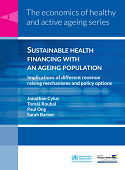Sustainable health financing with an ageing population: implications of different revenue raising mechanisms and policy options (2019)

Download
This is the second brief in the Economics of Healthy and Active Ageing series. While there have been many prior analyses of how population ageing affects health and long-term care expenditure trends, very little is known about how population ageing affects a country’s ability to generate revenues to pay for health. This brief looks at how health and long-term care systems are financed and reports on the potential effects of population ageing on countries’ ability to generate sufficient and stable revenues for health from common funding sources (i.e. income taxes, consumption taxes, property taxes and social contributions) in the future.
The authors simulate the effects of population ageing on countries’ ability to generate revenues, a) for countries with younger populations undergoing rapid population ageing and b) for countries that already have large populations of older adults. The analyses find that for countries where the population is comprised of a large share of relatively younger people who are likely to be active in the labour market, population ageing can have a positive impact on revenue generation from all funding sources. This leads to the challenge in many country contexts of strengthening tax collection mechanisms to take advantage of this opportunity. However, in countries with a large (and growing) older population, relying in particular on social contributions generated from the labour market to raise revenues for health is expected to result in fewer revenues per person over the coming decades.
The authors consider a number of policy options to address potential revenue shortcomings as a result of population ageing.
This brief was produced jointly with the WHO Centre for Health Development, Kobe, Japan.





















